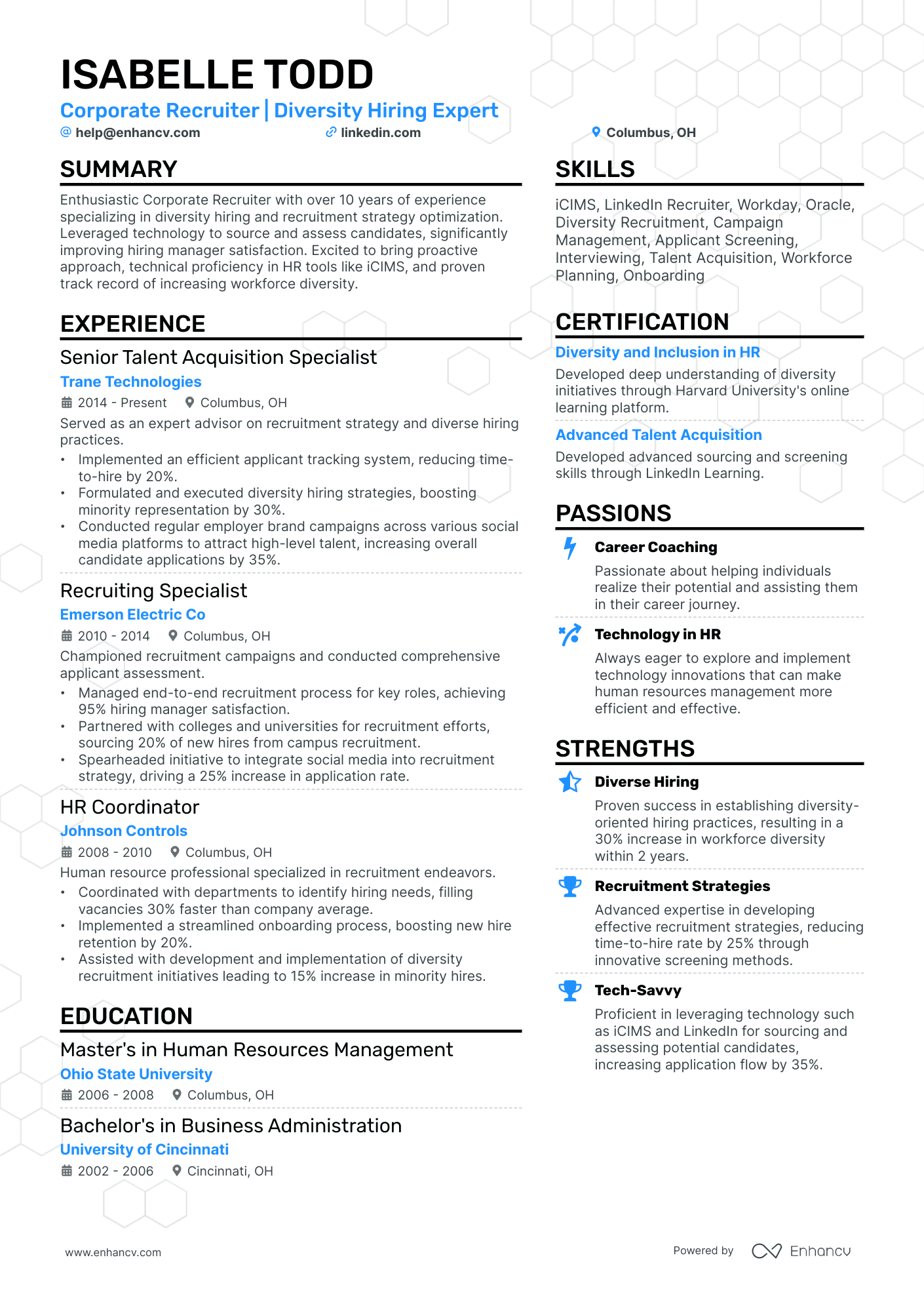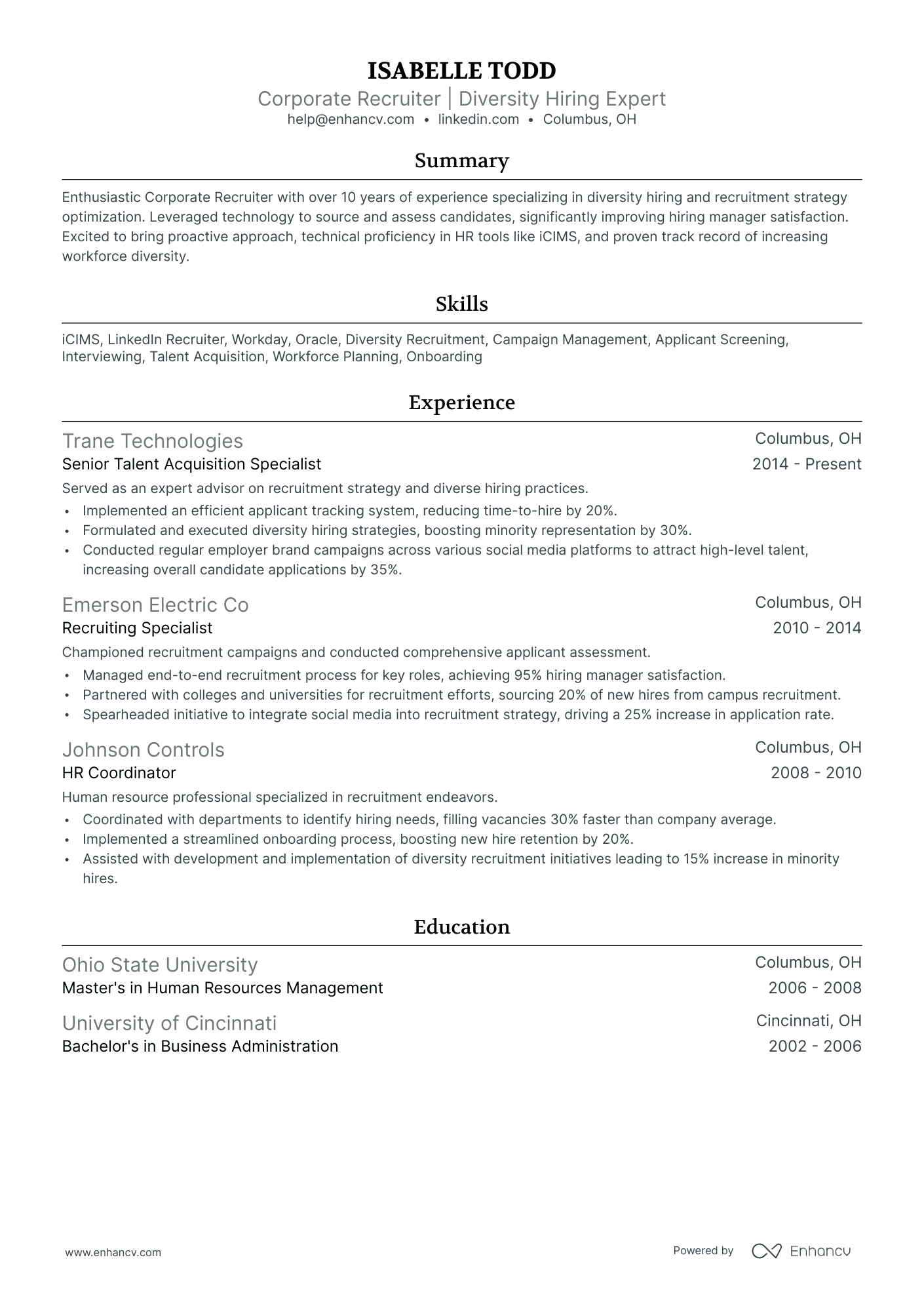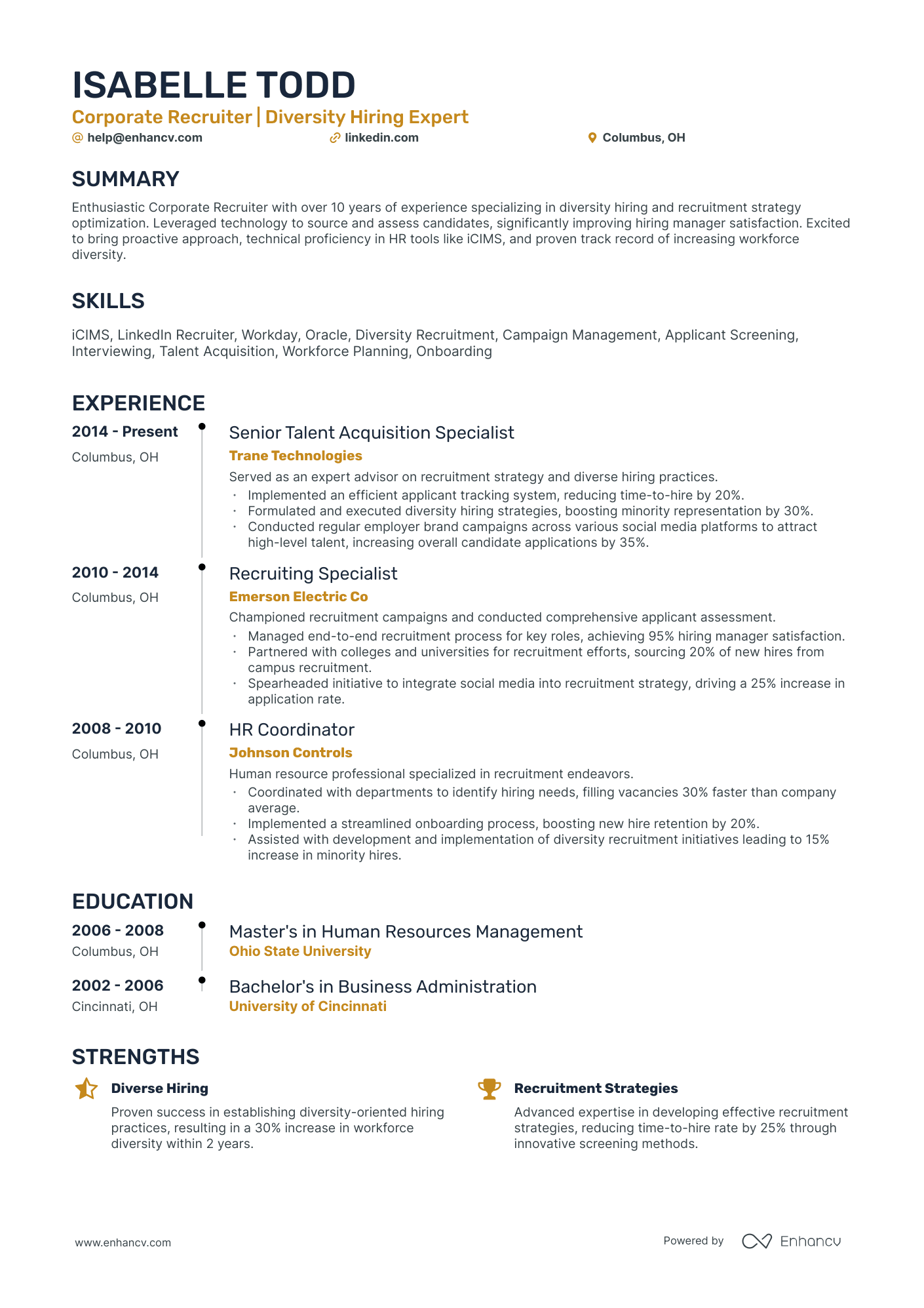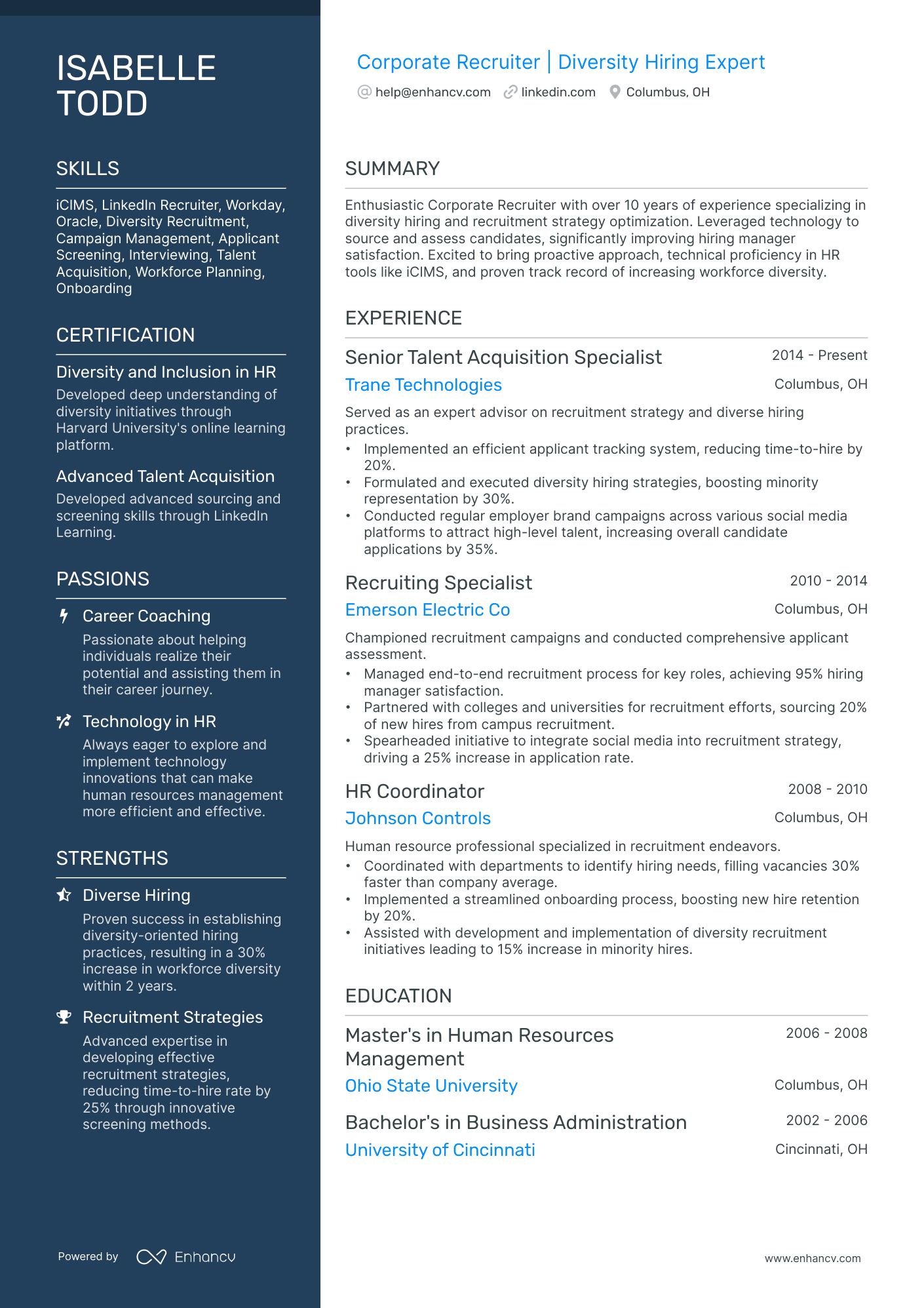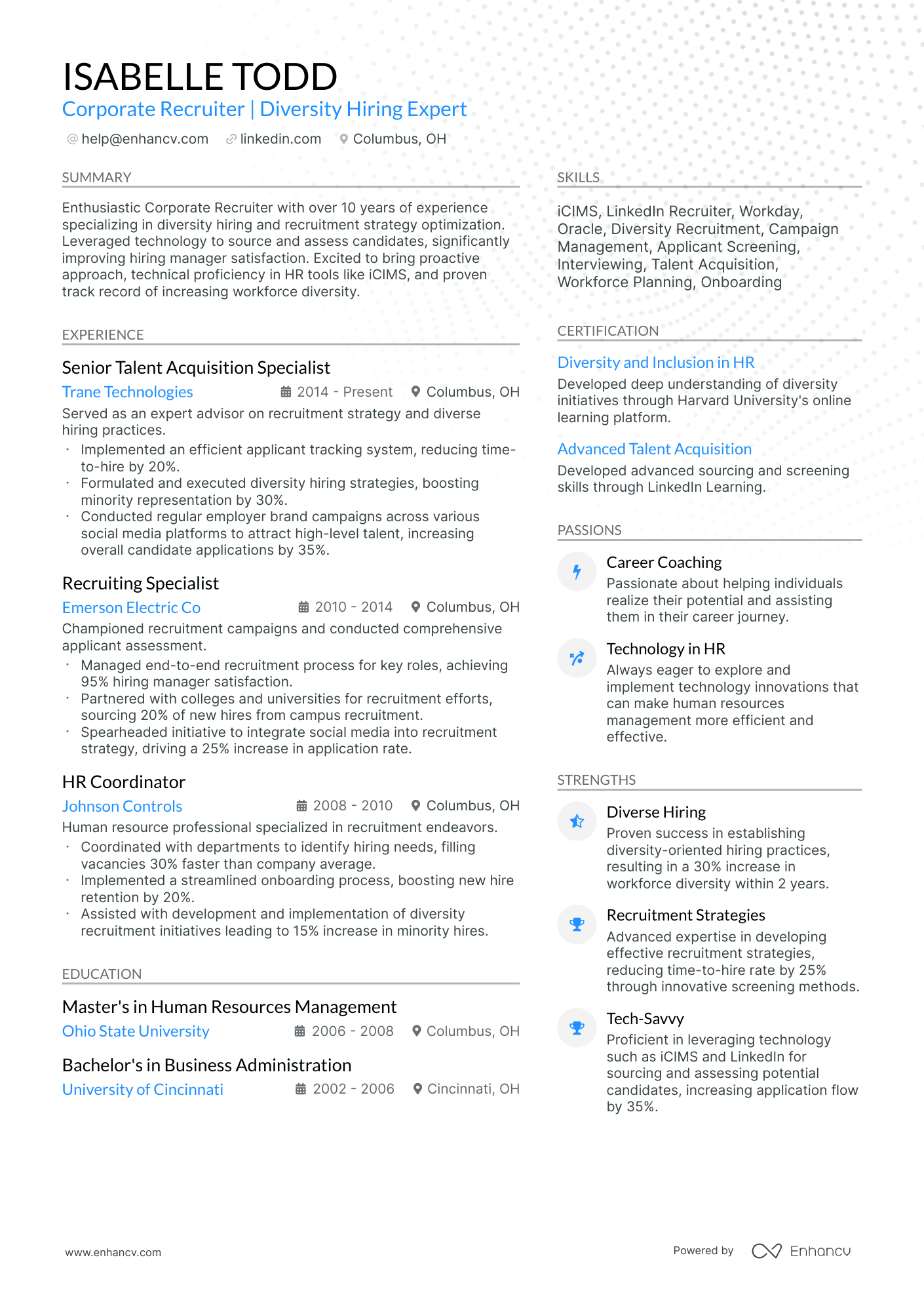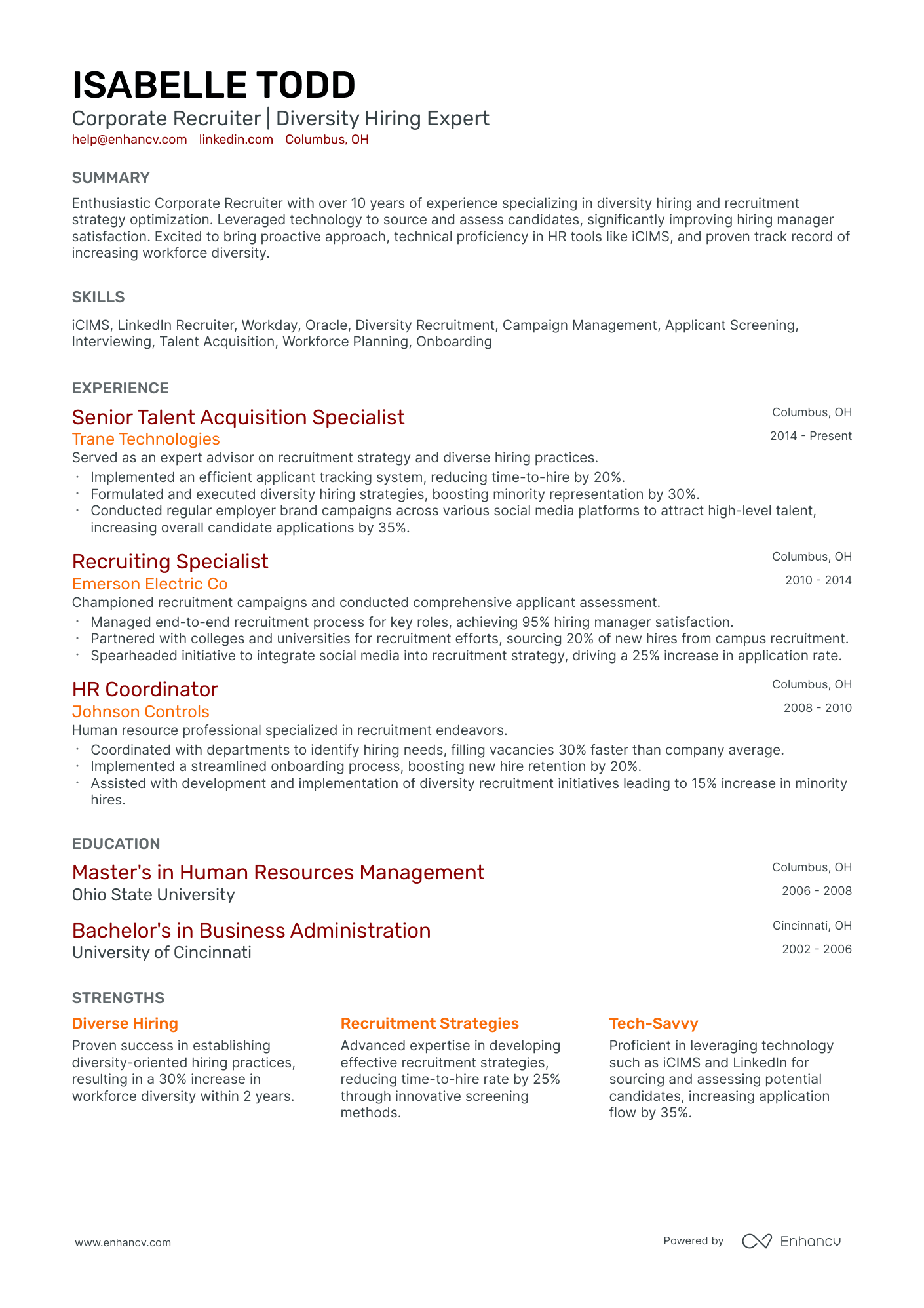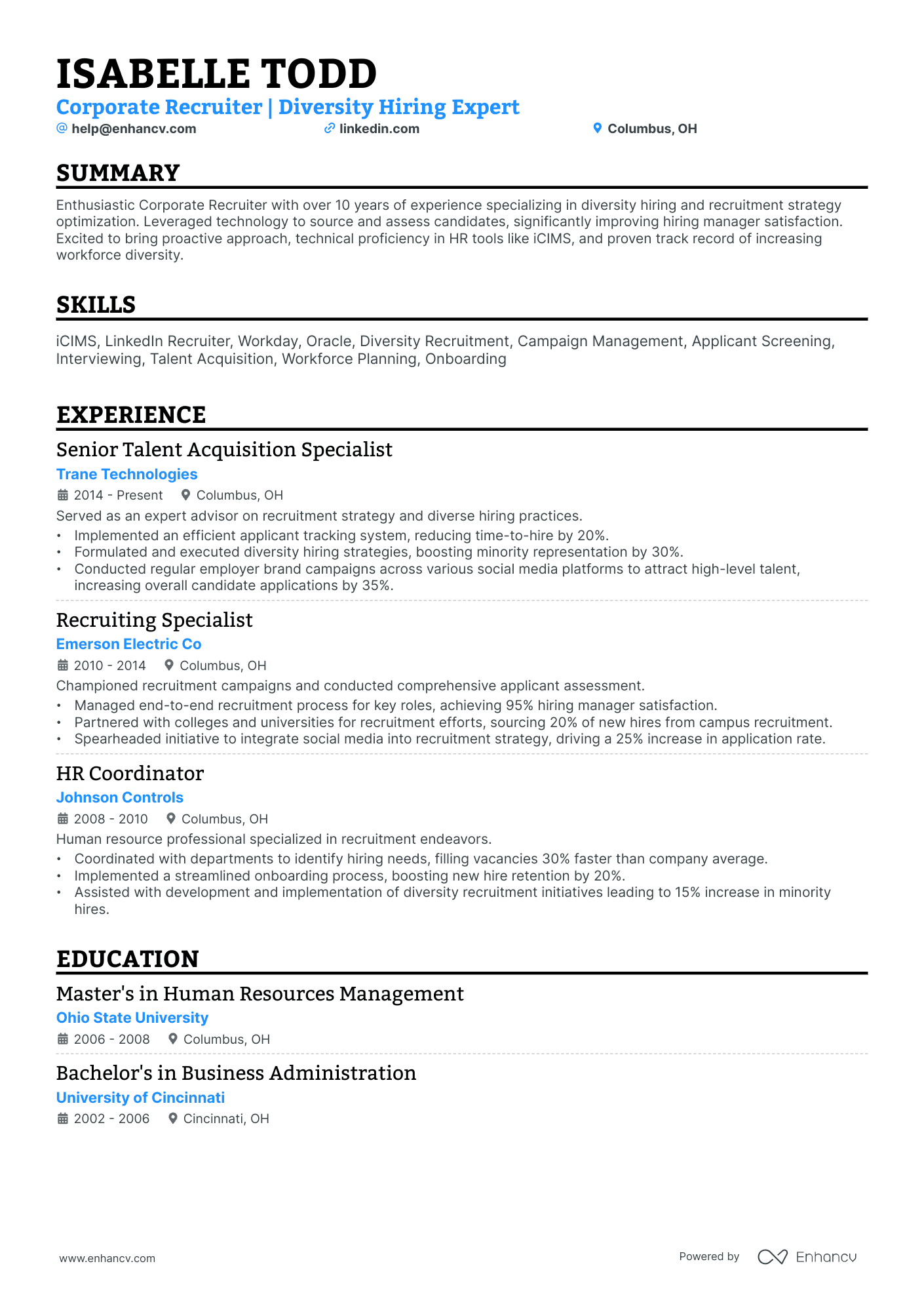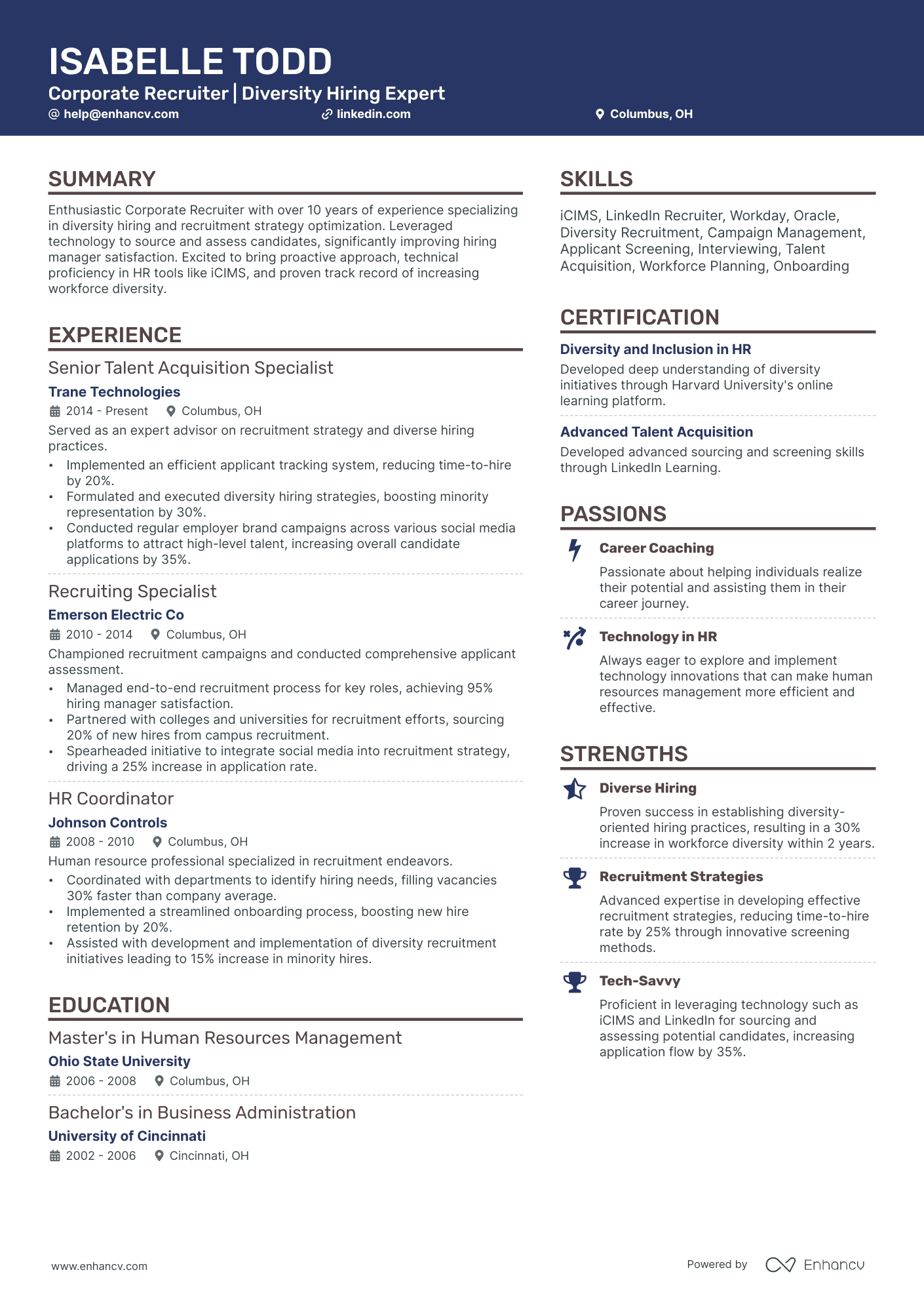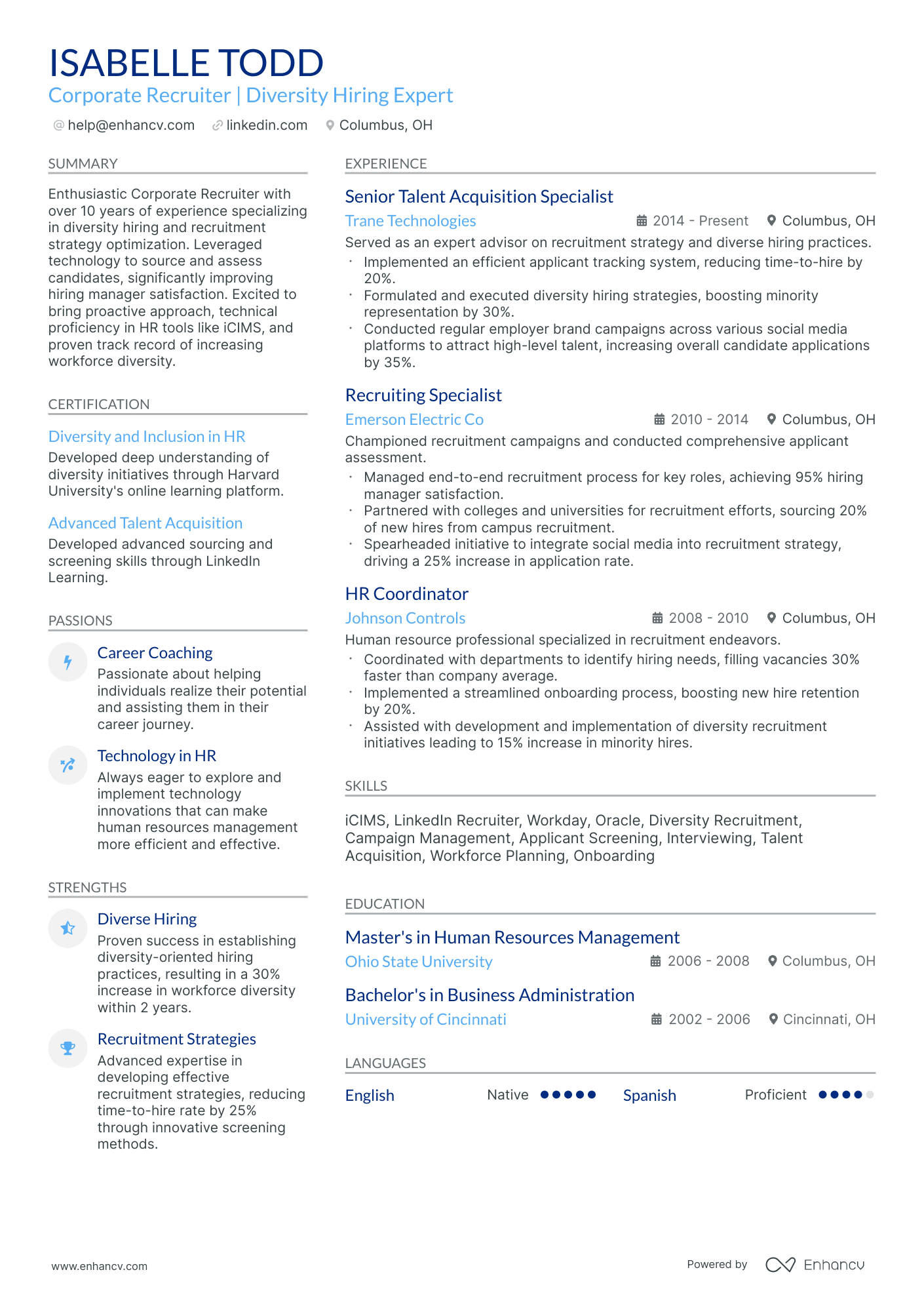A significant challenge faced by corporate recruiters is the task of efficiently sorting through and assessing a large volume of resumes to find the most qualified candidates. Our guide can assist in tackling this issue by providing strategies and tools for streamlining the resume review process, including utilizing applicant tracking systems (ATS) effectively, identifying key skill indicators, and implementing a structured evaluation framework.
Stay tuned for more ideas on how to write your corporate recruiter resume:
- Find different corporate recruiter resume examples to serve as inspiration to your professional presentation.
- How to use the summary or objective to highlight your career achievements.
- How to create the experience section to tell your story.
- Must have certificates and what to include in the education section of your resume.
Recommended reads:
Demystifying the corporate recruiter resume format
While a touch of creativity can be appealing, it's the clarity and relevance of your corporate recruiter resume format that truly resonates with recruiters.
To ensure your resume not only captures attention but also maintains it, consider these four streamlined steps:
- If your career boasts a wealth of pertinent and recent accomplishments, the reverse-chronological resume format is your ally. It naturally emphasizes your experience, placing your most recent roles at the forefront.
- Design a straightforward header: incorporate your contact information, a headline reflecting the position you're vying for or your current designation, and a link to your professional portfolio.
- While brevity is key, if you're targeting a senior position or have accumulated over ten years of industry-relevant experience, extending your resume to two pages is permissible.
- To ensure consistent formatting across various platforms, always save and submit your corporate recruiter resume as a PDF.
Upload your resume
Drop your resume here or choose a file. PDF & DOCX only. Max 2MB file size.
Pro tip
Keep your corporate recruiter resume clear and concise. Top professionals narrate their career stories while highlighting their strengths.
The five (plus) definite sections your resume for a technical recruiter job should include are:
- Header with your headline, contact details, and/or a preview of your work
- Summary (or objective) to pinpoint how your success aligns with the role
- Experience with bullets of your most relevant achievements in the field
- Skills to integrate vital job requirements (both technical and personal)
- Your further dedication to the field, showcased via relevant higher education and/or certifications
What recruiters want to see on your resume:
- Industry Knowledge: Deep understanding of the industry, including knowledge about competitive landscapes, market trends, and key players.
- Recruitment Process Management: Proficiency in overseeing the entire hiring process — candidate sourcing, screening, interviewing, and onboarding.
- Data-Driven Decision Making: Ability to use data analytics tools for talent acquisition — tracking KPIs, identifying patterns, and optimizing recruitment strategies.
- Talent Assessment Skills: Expertise in evaluating candidates not just based on their resumes, but also using behavioral and competency-based interviews.
- Communication and Relationship Building: Excellent interpersonal skills for liaising with hiring managers and candidates, plus ability to build strong relationships with universities, recruitment agencies, and other talent pools.
Recommended reads:
Optimizing the experience section of your corporate recruiter resume
The experience section is pivotal—it bridges the gap between your qualifications and the job's requirements.
To craft an impactful corporate recruiter experience section, consider these guidelines:
- Review the job posting to identify key requirements and align your past roles with these needs.
- Go beyond listing skills—demonstrate their impact through quantifiable achievements.
- Exclude roles that don't enhance your application or showcase relevant skills.
- While technical expertise is crucial, also highlight soft skills that add value to your role.
- Use action verbs to articulate your accomplishments and the skills employed to achieve them.
Below, we've provided corporate recruiter resume samples to inspire your experience section, ensuring it adheres to industry best practices.
- Managed full-cycle recruitment process for technical positions resulting in a 30% decrease in time-to-hire.
- Developed and implemented sourcing strategies to attract top talent from industry-specific job boards and social media platforms.
- Conducted thorough interviews and assessments to evaluate candidates' qualifications and cultural fit.
- Collaborated with hiring managers to define position requirements and create compelling job descriptions.
- Led campus recruitment initiatives, establishing partnerships with universities and organizing career fairs resulting in a 50% increase in new graduate hires.
- Managed the applicant tracking system and streamlined the recruitment process resulting in a 20% reduction in time-to-fill.
- Conducted behavioral interviews and administered pre-employment tests to identify high-potential candidates.
- Developed and delivered training sessions to hiring managers on effective interviewing techniques and best practices.
- Partnered with business leaders to develop workforce planning strategies and hiring forecasts.
- Implemented an employee referral program resulting in a 40% increase in quality candidate referrals.
- Utilized data analytics to track recruitment metrics and provide actionable insights for process improvement.
- Coordinated and facilitated assessment centers to evaluate candidates' skills and potential for leadership roles.
- Managed end-to-end recruitment process for executive-level positions resulting in the successful placement of key executives.
- Developed and maintained relationships with executive search firms resulting in a diverse candidate pool.
- Conducted in-depth interviews and reference checks to evaluate candidates' qualifications and leadership abilities.
- Collaborated with the executive team to define hiring criteria and create competency-based interview guides.
- Developed and executed comprehensive talent acquisition strategies to support company growth and expansion.
- Implemented an employer branding campaign resulting in a 25% increase in overall candidate applications.
- Led cross-functional teams to assess and select recruitment technology platforms to streamline processes.
- Designed and delivered training programs for hiring managers on unconscious bias and diversity hiring initiatives.
- Managed high-volume recruitment for customer service positions resulting in a 40% reduction in time-to-fill.
- Developed targeted sourcing strategies, including online job boards and community outreach programs.
- Conducted behavioral-based interviews and assessments to ensure a strong cultural fit within the organization.
- Collaborated with operations managers to analyze workforce needs and proactively address talent gaps.
- Oversaw the recruitment process for specialized technical roles resulting in a 30% increase in qualified hires.
- Implemented an applicant tracking system resulting in improved efficiency and streamlined reporting.
- Conducted technical screenings and assessments to evaluate candidates' skills and expertise.
- Collaborated with hiring managers to create tailored interview processes and assessment criteria.
- Developed comprehensive recruitment strategies for diverse positions within the organization.
- Established partnerships with external agencies resulting in a 20% increase in candidate quality.
- Designed and conducted competency-based interviews to assess candidates' qualifications and potential.
- Provided guidance and training to hiring managers on effective recruitment practices and legal compliance.
- Managed recruitment for remote positions, implementing virtual interviewing tools resulting in a 50% reduction in time-to-hire.
- Developed and executed sourcing strategies to attract top talent from remote work platforms and industry-specific forums.
- Conducted thorough online interviews and assessments to evaluate candidates' skills and remote work compatibility.
- Collaborated with hiring managers to define job requirements and create job postings optimized for remote work environment.
- Managed recruitment for executive and leadership positions resulting in the successful placement of key executives.
- Implemented a passive candidate sourcing strategy resulting in a 40% increase in high-quality executive applicants.
- Conducted rigorous interviews and assessments to evaluate candidates' qualifications, cultural fit, and leadership potential.
- Provided consultation and guidance to senior management on succession planning and talent development initiatives.
The following content includes information from "O*NET OnLine" by the U.S. Department of Labor, Employment and Training Administration (USDOL/ETA). Used under the CC BY 4.0 license. The data represents the top responsibilities present on the task lists for corporate recruiter professionals.
Top Responsibilities for Corporate Recruiter:
- Interpret and explain human resources policies, procedures, laws, standards, or regulations.
- Hire employees and process hiring-related paperwork.
- Maintain current knowledge of Equal Employment Opportunity (EEO) and affirmative action guidelines and laws, such as the Americans with Disabilities Act (ADA).
- Prepare or maintain employment records related to events, such as hiring, termination, leaves, transfers, or promotions, using human resources management system software.
- Address employee relations issues, such as harassment allegations, work complaints, or other employee concerns.
- Review employment applications and job orders to match applicants with job requirements.
- Inform job applicants of details such as duties and responsibilities, compensation, benefits, schedules, working conditions, or promotion opportunities.
- Select qualified job applicants or refer them to managers, making hiring recommendations when appropriate.
- Schedule or conduct new employee orientations.
- Maintain and update human resources documents, such as organizational charts, employee handbooks or directories, or performance evaluation forms.
Quantifying impact on your resume
<ul>
Tips for corporate recruiter newcomers launching their careers
Lacking extensive experience for that corporate recruiter role? No worries.
Sometimes, hiring managers go for the unexpected candidate when they see potential.
Here's how to convince them you're the right fit:
- Opt for the functional skill-based or hybrid formats to highlight your unique professional value.
- Always tailor your corporate recruiter resume to emphasize the most critical requirements, usually listed at the top of the job ad.
- Compensate for limited experience with other relevant sections like achievements, projects, and research.
- In your corporate recruiter resume objective, pinpoint both your achievements and how you envision your role in the position.
Recommended reads:
Pro tip
When detailing your career journey, there's no need to delve deep into early roles. Prioritize what resonates with recruiters. For senior positions, a decade-long retrospective can effectively illustrate your evolution.
Essential corporate recruiter resume skills
When recruiters review corporate recruiter resumes, they're looking for a mix of technical know-how and personal attributes.
Technical skills demonstrate your proficiency in specific tools or tasks. They indicate if you're ready to jump into the role or if you'll need extensive training.
On the other hand, soft skills reflect your interpersonal abilities. They show how you'll fit into a team or company culture.
To effectively present these skills on your resume:
- Design a skills section that highlights both your technical and interpersonal strengths.
- Provide examples where you've applied these skills, such as projects or tasks.
- For soft skills, describe situations where they've been crucial to your success.
- Use metrics, like improved efficiency or positive feedback, to validate your skills.
For inspiration, explore the preferred skills of leading corporate recruiter professionals.
Top skills for your corporate recruiter resume:
Applicant Tracking Systems (ATS)
LinkedIn Recruiter
Job Board Management (e.g., Indeed, Glassdoor)
Boolean Search Techniques
HR Software (e.g., Workday, BambooHR)
Data Analysis Tools (e.g., Excel, Google Analytics)
Interview Scheduling Software
Recruitment Marketing Tools
Background Check Services
Talent Management Systems
Communication
Negotiation
Interpersonal Skills
Time Management
Problem-Solving
Adaptability
Teamwork
Active Listening
Attention to Detail
Empathy
Next, you will find information on the top technologies for corporate recruiter professonals from "O*NET OnLine" by the U.S. Department of Labor, Employment and Training Administration (USDOL/ETA). Used under the CC BY 4.0 license.
Top technologies for Corporate Recruiter’s resume:
- Oracle PeopleSoft
- Workday software
- Blackboard software
- Oracle Taleo
- TempWorks recruiting and staffing software
Pro tip
The placement of your skills section should align with its importance. If it's a showcase of your most significant strengths, position it prominently near the top of your resume.
Choosing the right certifications and education for your corporate recruiter resume
Your education section can highlight skills and experiences perfect for the job.
- List college or university degrees with the school name and dates.
- If you're still studying, mention your expected graduation date.
- Think twice before adding unrelated degrees. Space on your resume is precious.
- Discuss educational achievements if they boost your job relevance.
There are many certifications out there. Which ones should you include?
- List your main degree in a separate section with the school name and dates.
- Only add certifications that highlight your skills and experience.
- Place unique or recent certifications near the top.
- Add a brief description to certifications if it helps show your skills.
Remember, it's not about quantity but relevance.
Best certifications to list on your resume
Pro tip
List your degrees in reverse order, starting with the newest. A recent PhD or unique field could set you apart.
Recommended reads:
Choosing between a resume summary or objective
Many corporate recruiter candidates ponder whether to include a resume summary or objective.
Here's a breakdown:
- A Resume objective outlines your career aspirations. It tells recruiters why you're applying and the value you can bring.
- A Resume summary offers a snapshot of your significant achievements, giving a quick overview of your expertise.
New professionals might lean towards an objective, while seasoned experts might prefer a summary. Whichever you choose, ensure it's tailored to the role.
For inspiration, review examples from established corporate recruiter professionals.
Resume summary and objective examples for a corporate recruiter resume
How to include other relevant sections for your corporate recruiter resume
Apart from the standard sections listed in this guide, you have the opportunity to get creative when building your profile.
Select additional resume sections that you deem align with the role, the department, or the company culture.
Here are the ones we recommend:
- Language skills - use a profficiency framework to indicate your aptitude level;
- Hobbies and interests - you can share more about your favorite books or how you spend your time. It's great for culture alignment;
- Volunteering - helps you highlight the causes you care about and hints at people skills you gained such as teamwork, emotional intelligence, and organizational skills;
- Awards - the space for your most prominent corporate recruiter professional accolades and achievements.
Make sure that these sections don't take too much away from your experience, but instead build up your corporate recruiter professional profile. You can add them as a second column to your resume, or on a second page.
Key takeaways
- Your resume should be a curated narrative, highlighting your alignment with the role's requirements.
- Strategically position your skills, balancing both technical and interpersonal strengths.
- Be selective in detailing experiences, focusing on relevance and impact.
- Utilize the summary or objective to offer a snapshot of your professional essence.
- Across all sections, prioritize authenticity and clarity, ensuring your resume resonates with the corporate recruiter role you're eyeing.
